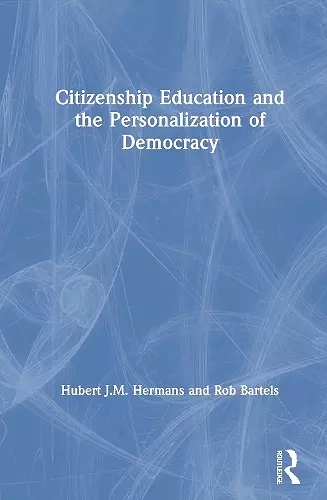Citizenship Education and the Personalization of Democracy
Hubert JM Hermans author Rob Bartels author
Format:Hardback
Publisher:Taylor & Francis Ltd
Published:30th Dec '20
Currently unavailable, and unfortunately no date known when it will be back
This hardback is available in another edition too:
- Paperback£41.99(9780367467890)

The core message of this educational book is that democracy is, more than ever before, in need of the personal contribution of engaged citizens. Democracy is viable only if it is rooted in the hearts and minds of citizens who feel responsible not only for their own well-being, but also for the quality of social relationships in a society with marked differences in race, religion, culture, and gender.
Three basic features define personalized democracy: A critical attitude not only towards others but also towards oneself; learning not only from others but also from oneself; and participation in society with attention to the contradictive nature of one’s own mind. The authors emphasize that the development of personalized democracy and global citizenship requires participation at different identity levels: I as individual, we as members of social groups, we as part of humanity, and we as part of the earth. Written for future teachers at secondary level, the book contains dialogical self theory, research and a wide range of exercises.
This book’s power lies in its central theme of personalizing and humanizing democracy, of removing it from its pedestal of abstraction and positioning it in the daily life of its key stakeholders—youth who will be responsible for keeping democracy vital in these troubled times. The authors argue that actions fundamental to the flourishing of democracy—opposition, cooperation, and participation—not only need to manifest outside the self, but also within and at the boundary of self and other. Ultimately, they provide students with a means to engage democracy, and not merely admire, or worse, take for granted its tenets.
Bob Fecho, Professor of English Education, Teachers College, Columbia University, USA.
We cannot enact democracy if we have no vital self-connection to it and this is painfully evident in current society. This book fills a void in educational literature and will offer crucial inspiration to students and educators in global citizenship education. Clear forms of self-reflection are rarely discussed in education while it is necessary for protecting freedoms and security within a society. Prejudice, stereotyping, and violence can be interrupted and transformed only when we cultivate an internal dialogue and unearth our own faulty thinking. This book provides the dialogical identity concepts and practices foundational for democratic citizenship.
Reinekke Lengelle, Assistant Professor Athabasca University and senior researcher The Hague University.
Achieving a more democratic society begins with oneself. Based on this intriguing premise, the creator of the Dialogical Self Theory and his colleague invite us to go through a stimulating self-learning process. Starting from our own experiences, the book invites us to question, evaluate, and foster our democratic attitude as citizens. An essential book for all educational agents who realize that building more democratic societies consists of stimulating students to develop more responsible, tolerant, and self-critical minds.
Carles Monereo, full professor of Educational Psychology at Universitat Autònoma de Barcelona.
ISBN: 9780367467906
Dimensions: unknown
Weight: 570g
194 pages